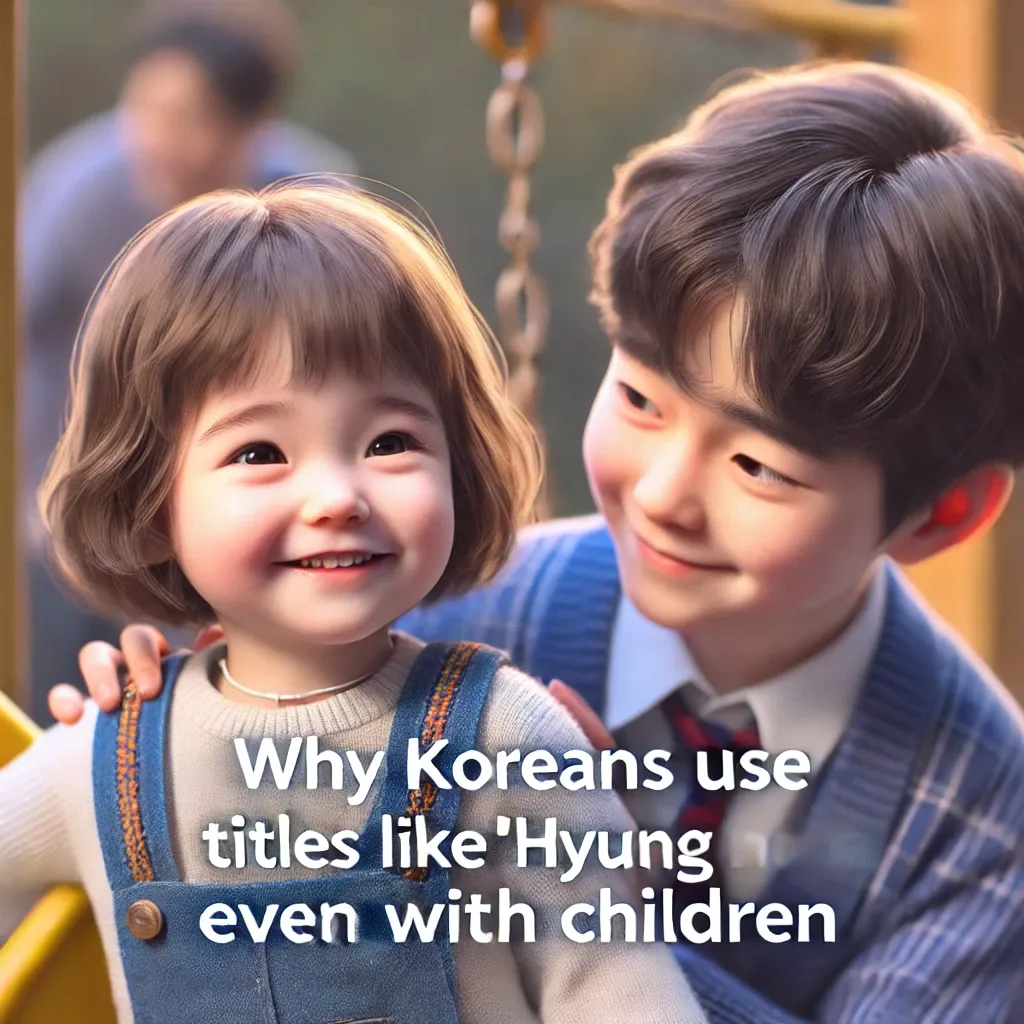Ever seen a toddler in Korea calling another child "Hyung" or "Noona" after just a brief meeting? It’s not just cute—it’s a window into a deep-rooted cultural system that starts with language.
In Korea, respectful titles like “Hyung” (형) and “Noona” (누나) are more than social niceties—they're early tools for teaching hierarchy, empathy, and communal values. This article explores why Korean children begin using these titles so young, and what that says about the culture they’re growing up in.

Why Do Korean Kids Use Titles So Early?
From the age of two or three, Korean children are taught to address older peers using sibling-like terms such as “Hyung,” “Noona,” “Oppa,” or “Unni.” Even a one-year age difference can trigger this habit. It’s not arbitrary—it’s intentional social training.
By using these titles, children acknowledge age hierarchy and begin to internalize the idea that age comes with different roles and expectations. It’s a simple yet effective way to instill structure in social interactions, even before formal schooling begins.
How These Titles Shape Emotional Intelligence
When a child calls someone “Noona,” it’s not just about age—it signals relational empathy. This encourages older children to act responsibly and younger children to recognize guidance. It’s a two-way flow of social learning.
This cultural script plays out daily in parks, classrooms, and playgrounds, where kids are expected to show care and listen to older peers. The titles themselves help build mini-communities where kindness and responsibility are natural extensions of speech.
Are These Titles Reserved Only for Family?
Interestingly, no. These honorifics are used for strangers too. A child might call a newly met playmate “Hyung” five minutes after sharing toys. The term instantly builds a pseudo-family dynamic, making social interactions smoother and more respectful.
It’s not just about etiquette—it’s about emotionally organizing one’s social world through language. This broad usage turns ordinary social spaces into familiar, emotionally safe zones.
The Role of Korean Language in Reinforcing These Norms
Korean is a hierarchical language. Using honorifics from a young age prepares children for navigating complex social tiers later in life—in school, friendships, and eventually in the workplace.
Children may not understand “social hierarchy” in theory, but they do understand that “Hyung” and “Noona” mean something special. These early lessons later blossom into more sophisticated expressions of respect and community behavior.
Harmony Over Individualism: What’s the Lesson?
Western cultures often prioritize individuality, but Korean culture leans toward harmony. These childhood titles are part of that framework. They teach kids to listen, adapt, and respect without coercion.
Far from being a rigid tradition, the use of “Hyung” and “Noona” supports smoother interactions and stronger bonds among children. It’s one of Korea’s many elegant ways of reinforcing unity through everyday language.
🎯 Summary
When Korean children call each other “Hyung” or “Noona,” they’re not just following tradition—they’re participating in a deep social lesson. These titles, used even among strangers, help build respect, empathy, and harmony from an early age. It’s one of Korea’s quiet yet profound cultural teachings.
한국에서 유아나 어린아이가 처음 만난 또래에게도 “형”, “누나”라고 부르는 장면을 본 적 있나요? 단순히 귀여운 습관이 아니라, 언어로 시작되는 깊은 문화 체계의 일면입니다.
‘형’, ‘누나’라는 호칭은 예의 이상의 의미를 지닙니다. 아이들이 아주 어린 나이부터 이런 호칭을 쓰는 이유는 한국 사회가 계층, 공감, 공동체 가치를 언어를 통해 어떻게 가르치는지를 잘 보여줍니다.

왜 한국 아이들은 호칭을 이렇게 빨리 배울까?
한국에서는 두세 살부터 나이가 조금 더 많은 아이들에게 “형”, “누나”, “오빠”, “언니”라고 부르도록 가르칩니다. 나이 차이가 단 1살이라도 이러한 호칭이 적용됩니다.
이러한 습관은 단순한 말버릇이 아니라, 사회적 역할과 기대를 배우는 훈련입니다. 정서 발달 초기부터 타인을 존중하고 구별하는 언어 구조 속에서 자라게 됩니다.
이 호칭이 정서지능에도 영향을 줄까?
아이들이 “누나”라고 부를 때, 그것은 단순한 호칭이 아닌 관계를 인지하는 행위입니다. 상대를 ‘조금 더 어른’으로 인식하며 배려와 책임이 동반됩니다.
놀이터나 교실, 유치원 등 일상 공간에서 이 문화는 자연스럽게 작동하며, 언어를 통해 ‘작은 사회’를 구성하는 방식이 됩니다.
이런 호칭은 가족에게만 쓰는 걸까?
아닙니다. 한국에서는 낯선 사이에도 나이 차이가 느껴지면 “형”, “누나”라고 부릅니다. 몇 분만 같이 놀아도 금방 이런 호칭을 쓰는 것이 익숙하죠.
이는 감정적 거리감을 줄이고, 낯선 상황을 더 편안하게 만드는 효과가 있습니다. 언어로 사회적 질서를 정돈하고자 하는 한국 문화의 특징입니다.
언어 구조도 이 문화를 뒷받침한다
한국어는 높임말과 위계 표현이 정교하게 짜여 있습니다. 이런 구조를 어린 시절부터 익히게 함으로써, 아이들은 성장하면서 복잡한 사회적 층위를 자연스럽게 이해하게 됩니다.
형·누나라는 단어는 단지 나이를 말하는 것이 아니라, 상대에 대한 태도를 내포하는 언어입니다. 그 자체로 교육이 되는 셈이죠.
개인보다 조화를 중시하는 사회의 언어 교육
서양에서는 개인주의가 강하다면, 한국은 조화로운 사회 관계를 중요시합니다. 이런 호칭 습관은 조화와 배려를 어릴 때부터 길러주는 도구입니다.
호칭 하나로도 질서를 배우고 역할을 익히며, 공동체 속에서 자신의 위치를 인지하는 언어 교육이 한국에서는 자연스럽게 이루어집니다.
🎯 요약
한국 아이들이 “형”이나 “누나”라고 부르는 것은 단지 전통이 아닙니다. 관계를 인식하고, 공감과 존중을 배우는 문화적 학습입니다. 낯선 사람에게도 이러한 호칭을 쓰는 문화는 조화로운 사회를 지향하는 한국의 정서를 잘 드러냅니다.